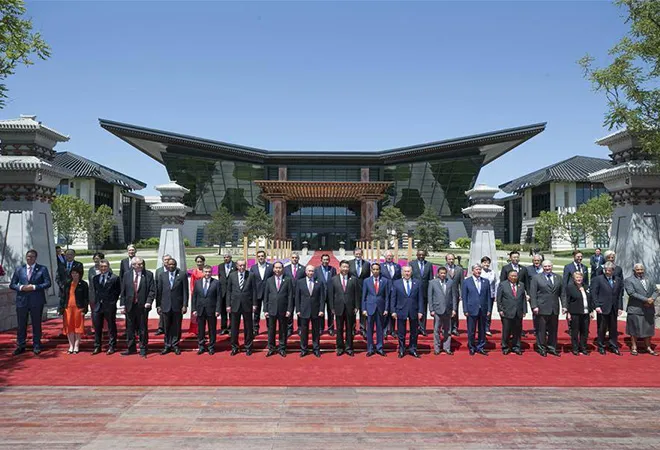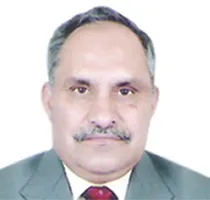There is more than a little irony to the fact that it has taken just about a 100 days for the institutions of democracy, that were built over approximately 250 years ago, to start showing signs of serious wear and tear. All of this, thanks to the shenanigans of Donald Trump, the US President. An alleged megalomaniac and congenital liar, as per a Washington Post report, he has misrepresented the truth or lied 589 times, and has little respect for due process and rule of law. He has been called worse. Well-known American documentary filmmaker, Michael Moore, famously referred to Trump on his website as “wretched, ignorant, dangerous part-time clown and full time sociopath”.
That he finds himself bogged down in a pretty dangerous political mine field is no thanks to either his party colleagues, (most of whom seem to have nodded off) or the Democrats who lack the required legislative strength in Congress. It is wholly due to a vigilant and independent judicial system and a robust and combative media that refuses to be cowed down by threats. That he is also considered the de facto leader of the free world, given the US’s pre-eminence, is disturbing to say the least, especially if he actually manages to overcome the domestic turbulence he presently faces.
Closer at home, this must be causing some alarm for our diplomatic establishment and political leadership, as they would find it difficult to gauge as to what to expect from Trump’s constant and unexpected policy flip-flops. Take for instance, his outlook on China. As President-elect, he shocked the Chinese leadership by telephoning President Tsai Ing-wen of Taiwan, thereby putting in doubt the four decade long policy on ‘One China’ which involves officially recognising China and not Taiwan. This, along with his earlier accusations against China’s trade and currency manipulations, were expected to make his meeting with Chinese President Xi Jinping during his visit to the US, in his own words, “a very difficult one.”
However, by the end of it he waxed eloquence and suggested: “We have made tremendous progress in our relationship with China… We will be making additional progress. The relationship developed by President Xi and myself, I think, is outstanding.” Most importantly, he overturned decades old bipartisan policy of not linking trade with the North Korean problem by stating to the Wall Street Journal, “We have tremendous trade deficits with everybody, but the big one is with China. And I told them, ‘You want to make a great deal?’ Solve the problem in North Korea. That’s worth having deficits. And that’s worth having not as good a trade deal as I would normally be able to make.”
With regard to the subcontinent, he had this to say on his campaign trail, “I am a big fan of Hindu. I am a big fan of India”, and called Pakistan “the most dangerous country in the world today, the only country that can check Pakistan is India.” Yet, there are doubts whether he will actually shape policy and follow up on what he had said. In our context it seems unlikely that he will not continue to strengthen the two decade old strategic engagement or reverse Barack Obama’s commitments on Nuclear Suppliers Group (NSG) membership and a seat on the United Nations Security Council (UNSC), though there is a possibility that he may not accord them the same priority as analysts like Karan Thapar suggest.
All of this is, off course, only of academic interest because it is high time we face the fact that big boys have to fight their own battles. Whatever are our issues with China or Pakistan, there is only so much that the international community can do to help and we will have to confront them on our own and resolve issues to the best of our abilities.
In the Kulbhushan Jadhav case, for example, let’s not be under any misapprehension that our approaching the International Court of Justice, while fully justified, can do anything other than delay his execution, if he has already not been murdered. Its prevention can only be achieved by the range of actions if we are willing to adopt those. It is in this context that we should examine China’s One Belt One Road (OBOR) initiative and its centrepiece the China Pakistan Economic Corridor (CPEC). We have little choice but to deal with its impact by facing off squarely on our own.
Respected analysts have suggested that we have pushed ourselves into a corner and isolated ourselves from the world community by our refusal to attend the recent meeting hosted by President Xi at Beijing. The complete absence of any respect for our claims by China on Gilgit-Baltistan, through which the CPEC runs, the main reason for our absence, has been completely ignored or belittled since we are unlikely to get back this territory any time soon. They have further suggested that because of envy, we have missed out on the long-term economic benefits that are bound to accrue if the project is successful.
They may be right in what they suggest, but it seems foolish to ignore that national identity and prestige are just as important as they are in our own personal lives and sometimes you have to be willing to suffer to uphold your prestige and honour. No other nation that attended the conference have probably faced the sustained and protracted hostility that we have been subjected to by China over the past seventy years.
It is a matter of record that false histories and maps have been manufactured by China to further its claims on our territorial integrity. That it has nurtured Pakistan’s ambition and provided it with nuclear and missile technology over the years to constrain Indian influence beyond a certain region is also no secret. In fact, its opposition to our claims to join the NSG or for a seat at the UNSC as well as its support for Pakistan sponsored terrorist groups and factions such as the Nationalist Socialist Council of Nagaland (NSCN) and United Liberation Front of Asom (ULFA) are serious impediments to our developing a mutually beneficial partnership.
There are also serious doubts about the CPEC itself, given the revelations of Chinese plans for it in Pakistan’s Dawn newspaper. If even partially true, the vision enunciated suggests that Pakistan would be used as a source of crops, raw material and minerals — all of which would be carried out by Chinese companies with Pakistani labour. In return, China would provide Pakistan with finished value added products at rates it would fix. All of this, off course, would require Pakistan to provide guarantees so that Chinese investments are safe. All of this certainly draws comparisons to the fate that befell the subcontinent under the East India Company, the Chinese project appears to go one step beyond colonisation to assimilation.
Grabbing thousands of acres of arable land, visa free travel for Chinese, linking the Pakistani currency to the ‘Renminbi’ and establishment of tourism and entertainment zones along the Arabian sea can mean nothing else. Unlike most analysis who suggest that the CPEC provides China with an alternative option to avoid what has been termed as the “Malacca Dilemma”, the land appropriation for agriculture seems to be the essence and driving force for the project. This is understandable given the fact that China has only 105.7 million hectares of arable land compared to 156 million hectares in our case, despite having a total land area of around nine million square kilometres, while we are just about a third of that.
Given all this, it is unlikely that turbulence within Pakistan will reduce even if the CPEC achieves a modicum of success and leads to prosperity. As we have seen in Myanmar, where Chinese projects abound, the local population is likely to be further marginalised while politicians, middle men and the Chinese make a fortune. Whatever be the end result, it is unlikely that we will see any improvement in the security environment we are dealing with, even if we had, like good little boys, been present for the OBOR conference.
This commentary originally appeared in The Pioneer.
The views expressed above belong to the author(s). ORF research and analyses now available on Telegram! Click here to access our curated content — blogs, longforms and interviews.




 PREV
PREV


